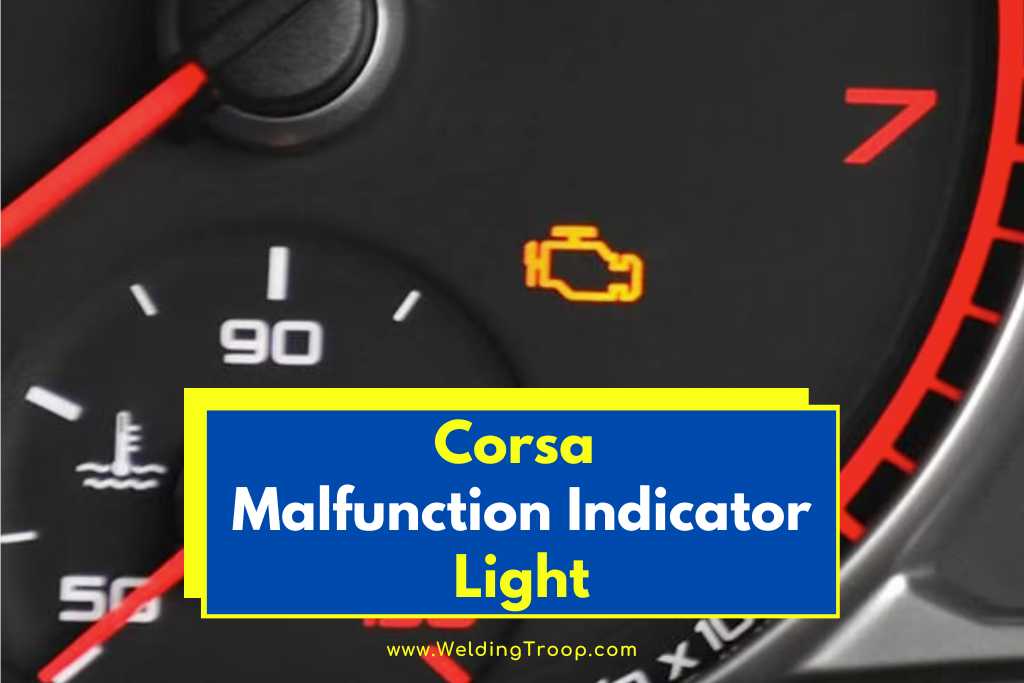The check engine light in your Corsa is a crucial indicator that alerts you to potential engine problems. When this warning light illuminates on your dashboard, it’s essential to understand its meaning and take appropriate actions to prevent further damage to your vehicle.
We will explore the causes, meaning, and actions to take when faced with the check engine light in your Corsa.
Table of Contents
1. What is the Check Engine Light?
The check engine light is a vital component of every vehicle equipped with an electronic engine management system. Its primary function is to alert drivers about any potential engine problems.
In some Corsa models, the check engine light comes in two colors: yellow, indicating minor issues, and red, indicating more severe problems.
2. Understanding Engine Monitoring in Your Corsa
While driving, the computer system in your Corsa constantly monitors various aspects of your engine, including air/fuel supply and exhaust gases, to ensure optimal performance.
If any issues are detected during this monitoring process, the check engine light will illuminate on your dashboard.
3. Interpreting the Check Engine Light Status and Severity
The check engine light can behave in different ways, indicating varying levels of severity. It’s essential to understand the different light signals to determine the urgency of the problem. Here are the common check engine light statuses:
- The light turns on when you switch on the ignition key and then turns off: This is a normal function to ensure the light is working correctly.
- The light blinks and then turns off cyclically: Indicates a past issue that is not currently occurring.
- The light remains steady: Indicates a problem that is not severe enough to stop driving your vehicle.
- The light blinks continuously: Indicates a critical problem that requires immediate attention. It is advisable to stop driving your vehicle in this situation.
4. Common Causes of the Check Engine Light in Your Corsa
The check engine light in your Corsa can be triggered by various factors. Here are some of the most common causes and their associated symptoms:
4.1 Ignition Cylinder Problems
Irregular engine running can be an indicator of ignition cylinder problems. If you experience engine misfires or notice rough running, it’s essential to have your ignition cylinder checked.
4.2 Exhaust Gas Oxygen Sensor (Lambda Probe) Issues
Issues with the exhaust gas oxygen sensor can result in irregular engine running, especially when accelerating abruptly or driving at low revs. This problem can be caused by a faulty sensor or a failure in the catalytic converter.
4.3 Engine Intake Problems
Problems with the engine intake, whether related to air or fuel supply, can lead to rough or irregular engine running. If you notice these symptoms, it’s crucial to have your engine intake system inspected.
4.4 Electrical System Faults
The electrical system in your Corsa can also contribute to check engine light illumination. Identifying the exact cause of electrical system problems may require thorough testing and diagnostics.
4.5 Sensor Malfunction
A malfunctioning sensor can significantly impact engine performance, causing it to run poorly or even stall. It’s essential to determine the specific sensor causing the issue for proper resolution.
4.6 Wiring Problems
Wiring issues, such as contact failure, cut wires, or short circuits, can disrupt the normal functioning of your Corsa’s engine. Identifying and repairing these wiring problems is crucial for resolving the check engine light issue.
Read also >> Malfunction Indicator Lamp (Step by Step Solved!)
Read also >> Warning Light Malfunction (Here Is How To Fix)
5. Diagnostic Methods for Check Engine Light Issues
To accurately diagnose the cause of the check engine light in your Corsa, it is crucial to have access to a suitable scanner that is compatible with your vehicle’s brand and model.
The scanner will retrieve the engine fault code, providing valuable information about the specific problem affecting your engine.
6. Taking Action: What to Do When the Check Engine Light Illuminates
When faced with the check engine light in your Corsa, it’s important to take appropriate actions to address the issue and prevent further damage. Here are the steps to follow:
- Do not ignore the light: The check engine light is a warning sign that should not be ignored. Continuing to drive with the light illuminated can potentially cause irreparable damage to your engine.
- Check for immediate issues: Assess the immediate symptoms, such as loss of power or unusual engine behavior, to determine if it is safe to continue driving. If you experience severe issues, it may be necessary to stop and seek professional assistance.
- Inspect the gas cap: A loose or faulty gas cap can trigger the check engine light. Ensure that the cap is properly tightened and secured.
- Check the owner’s manual: Consult your Corsa’s owner’s manual to understand the potential causes of the check engine light and any recommended actions specific to your vehicle.
- Seek professional assistance: If the check engine light persists or if you are unsure about the cause, it is advisable to take your Corsa to a certified mechanic or authorized service center for diagnostics and repairs.
7. Maintaining Your Corsa to Prevent Check Engine Light Issues
Regular vehicle maintenance is key to preventing check engine light issues in your Corsa. Here are some maintenance tips to keep your vehicle in optimal condition:
- Follow the manufacturer’s recommended maintenance schedule: Adhering to the recommended maintenance intervals for oil changes, filter replacements, and other routine services can help prevent potential engine problems.
- Address minor issues promptly: If you notice any unusual sounds, vibrations, or performance issues, have them inspected and repaired promptly to prevent more significant problems.
- Keep your Corsa’s electrical system in check: Regularly inspect and maintain the electrical system components, such as the battery, alternator, and wiring, to avoid potential issues that could trigger the check engine light.
- Ensure proper fuel and air intake: Maintain clean air filters and fuel filters to ensure optimal fuel combustion and prevent issues with the engine intake system.
- Monitor fluid levels: Regularly check and maintain proper levels of engine oil, coolant, and other fluids to ensure smooth engine operation.
8. Passing the MOT with a Check Engine Light
When undergoing an MOT test, it is essential to ensure that the check engine light is not illuminated. As per the stricter MOT rules implemented in 2018, any vehicle with an illuminated engine management light, regardless of its color, would automatically fail the test. Therefore, it’s crucial to address any check engine light issues before taking your Corsa for an MOT.
9. Resetting the Check Engine Light
Resetting the check engine light is often necessary after resolving the underlying issue. In most cases, only an authorized mechanic can reset the light using specialized diagnostic equipment. Attempting to reset the light without addressing the problem may result in recurring issues and potential damage to your vehicle.
10. Conclusion
The check engine light in your Corsa serves as a vital warning system, alerting you to potential engine problems.
Understanding its meaning and taking appropriate actions when it illuminates are crucial for maintaining your vehicle’s performance and preventing further damage.
By addressing check engine light issues promptly and maintaining regular vehicle maintenance, you can ensure the longevity and optimal performance of your Corsa.
Remember, if you are unsure about the cause of the check engine light or need assistance, it is always best to consult with a certified mechanic or authorized service center to diagnose and resolve the issue effectively.

